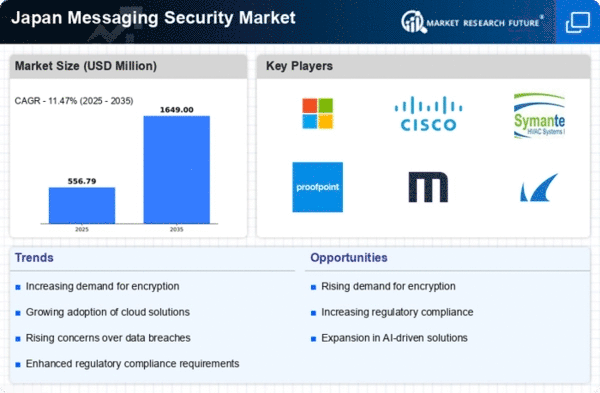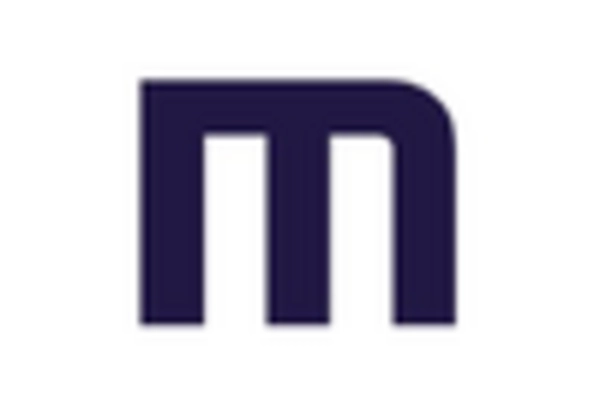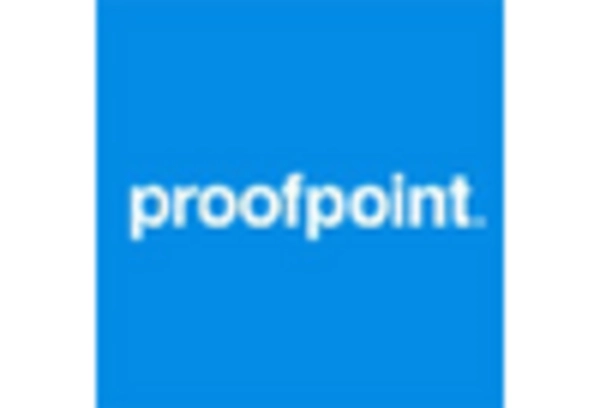Growing Mobile Workforce
The rise of remote work and mobile workforce in Japan has transformed the landscape of communication, thereby impacting the messaging security market. As employees increasingly rely on mobile devices for work-related communications, the potential for security vulnerabilities escalates. In 2025, it is anticipated that mobile devices will account for over 50% of business communications in Japan. This shift necessitates the implementation of comprehensive messaging security solutions that can protect sensitive information transmitted via mobile platforms. Organizations are likely to invest in advanced security measures to ensure the integrity and confidentiality of their communications, driving growth in the messaging security market.
Rising Cybersecurity Threats
The increasing frequency and sophistication of cyber threats in Japan has propelled the demand for robust solutions in the messaging security market. Cybercriminals are employing advanced tactics, such as phishing and ransomware, targeting organizations across various sectors. In 2025, it is estimated that cybercrime could cost Japanese businesses over $100 billion annually. This alarming trend necessitates enhanced security measures to protect sensitive communications. As organizations recognize the potential financial and reputational damage from breaches, investments in messaging security solutions are likely to surge. The messaging security market is thus positioned to grow as companies seek to safeguard their data and maintain compliance with evolving regulations.
Adoption of Cloud-Based Solutions
The shift towards cloud computing in Japan has significantly influenced the messaging security market. Organizations are increasingly migrating their operations to cloud platforms, which necessitates the implementation of effective security measures to protect cloud-based communications. By 2025, it is projected that over 70% of Japanese enterprises will utilize cloud services, creating a substantial demand for messaging security solutions tailored for cloud environments. This transition not only enhances operational efficiency but also raises concerns regarding data privacy and security. Consequently, the messaging security market is expected to expand as businesses seek solutions that ensure secure messaging in cloud infrastructures, thereby mitigating risks associated with data breaches.
Increased Awareness of Data Privacy
In Japan, there is a growing awareness regarding data privacy and protection among consumers and businesses alike. Recent legislative changes have heightened the focus on safeguarding personal information, compelling organizations to adopt stringent security measures. The messaging security market is experiencing a surge in demand as companies strive to comply with these regulations and protect customer data. By 2025, it is expected that the market for data protection solutions will grow by over 30%, reflecting the urgency for effective messaging security. This heightened awareness is likely to drive investments in technologies that ensure secure messaging practices, thereby fostering growth in the messaging security market.
Technological Advancements in Security Solutions
The rapid evolution of technology in Japan is significantly shaping the messaging security market. Innovations such as artificial intelligence and machine learning are being integrated into security solutions, enhancing their effectiveness in detecting and mitigating threats. As organizations seek to leverage these advancements, the demand for sophisticated messaging security solutions is likely to increase. By 2025, it is projected that the market for AI-driven security solutions will expand by approximately 25%, indicating a strong trend towards adopting cutting-edge technologies. This technological progression not only improves the efficiency of security measures but also positions the messaging security market for substantial growth as businesses prioritize advanced protection against emerging threats.
















